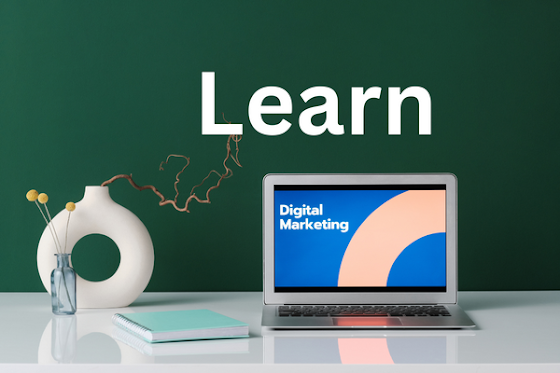Digital Marketing
The study of digital marketing demands both theoretical understanding and practical abilities. You can take the following actions to learn digital marketing:
1. Understand the basics: Start by understanding the fundamental concepts of digital marketing, such as SEO, PPC, social media marketing, email marketing, content marketing, and analytics.
2. Choose your specialization: Digital marketing covers a broad range of topics, so you need to decide which areas you want to specialize in. For example, you can choose to become an SEO expert, a social media marketer, or a content marketer.
3. Enroll in a course: There are many online courses and certifications that can teach you digital marketing. You can start by enrolling in courses on websites such as Coursera, Udemy, or Google Digital Garage.
4. Practice: Practice is essential to develop your digital marketing skills. You can start by creating your website or blog, running social media campaigns, or practicing SEO techniques.
5. Network: Attend digital marketing conferences and events, connect with other digital marketers on social media, and join online communities to learn from experienced professionals.
6. Stay up to date: Digital marketing is continually evolving, so it's essential to keep up with the latest trends and updates. Follow industry experts, read blogs and books, and attend webinars and workshops.
Also Read: 10 Google SEO Ranking Factors That You Need To Know
Types of Digital Marketing
There are several types of digital marketing, each with its own unique strategy and approach. Here are a few of the more popular varieties:
1. Search Engine Optimization (SEO): SEO is the practice of optimizing your website to rank higher in search engine results pages (SERPs) for specific keywords and phrases. This includes optimizing website content, meta tags, and other elements to make them more visible to search engines.
2. Pay-Per-Click Advertising (PPC): PPC is a type of digital advertising where you pay for each click on your ad. These advertisements may be shown on websites, social media networks, and search engine results in pages.
3. Social Media Marketing (SMM): SMM involves promoting your brand and content on social media platforms such as Facebook, Twitter, Instagram, and LinkedIn. This can involve influencer marketing, paid to advertise, and organic posts.
4. Content Marketing: Content marketing involves creating and sharing valuable, relevant, and consistent content to attract and retain a target audience. This can be done with articles on blogs, infographics, videos, and other information types.
5. Email Marketing: Email marketing involves sending targeted messages to a list of subscribers. This can apply to emails with promotions, newsletters, and other content.
6. Affiliate Marketing: Affiliate marketing is the practice of collaborating with other companies or people to market your goods or services in return for a commission.
7. Influencer Marketing: Influencer marketing involves partnering with social media influencers or bloggers to promote your brand or products to their audience.
Just a few of the most typical forms of digital marketing are listed here. To create an effective digital marketing strategy, it's essential to understand the strengths and weaknesses of each type and how they can work together to achieve your business goals.
Remember that learning digital marketing is an ongoing process, so be patient, stay focused, and keep learning. Good luck!
Also Read: Why you should choose Digital marketing as a career?



.png)
.png)
.png)
.png)

No comments:
Post a Comment